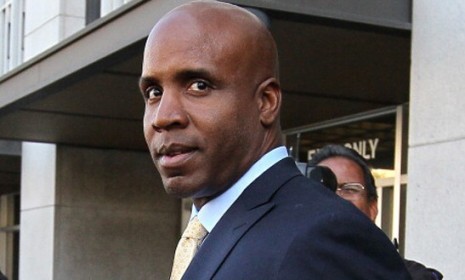The role of race in Barry Bonds' prosecution
Why has the government spent millions of dollars in its dogged pursuit of baseball's home run king? In large part, because of his skin color, says William Rhoden at The New York Times

A free daily email with the biggest news stories of the day – and the best features from TheWeek.com
You are now subscribed
Your newsletter sign-up was successful
"The trial of Barry Bonds has always been more than a simple case of pursuing a bad guy and proving that he lied," says William Rhoden at The New York Times. Of course, prosecutors want to expose the most visible symbol of baseball's regrettable steroids era. But "the eight-year pursuit of Bonds also reflects America's discomfort with prominent, powerful, wealthy black men." This might seem "incredible" given America's election of Barack Obama just two years ago. But Bonds, who has long had an antagonistic relationship with reporters and fans, and is now charged with lying to a grand jury about his steroids use, isn't like Obama. His story is more reminiscent of the great early-20th-century boxing champion Jack Johnson, whose "fast, unapologetic lifestyle," rankled the white majority, much as Bonds's arrogance does. Johnson was sentenced to a year in prison for crossing state lines with a white prostitute — but really "because powerful forces within the government felt that a black man who lived such a brazenly bodacious lifestyle was a threat to America’s racial order and had to be taught a lesson." Here, an excerpt:
In 1913, the government hid behind the Mann Act to prosecute a powerful, prominent black man it felt needed to be taught a lesson. Now the government has invested eight years and millions of dollars to go after another prominent, powerful black man with a vigor that suggests there is more in play than the altruistic goal of protecting the integrity of a grand jury.
The prosecution, regardless of the verdict, was a colossal misuse of time and money aimed, it seems, at making an example of a larger-than-life figure whose greatest sin was being an unlikable home run king.
The Week
Escape your echo chamber. Get the facts behind the news, plus analysis from multiple perspectives.

Sign up for The Week's Free Newsletters
From our morning news briefing to a weekly Good News Newsletter, get the best of The Week delivered directly to your inbox.
From our morning news briefing to a weekly Good News Newsletter, get the best of The Week delivered directly to your inbox.
Read the entire piece at The New York Times.
A free daily email with the biggest news stories of the day – and the best features from TheWeek.com
-
 The week’s best photos
The week’s best photosIn Pictures An Andean god, a rogue squirrel, and more
-
 ‘Zero trimester’ influencers believe a healthy pregnancy is a choice
‘Zero trimester’ influencers believe a healthy pregnancy is a choiceThe Explainer Is prepping during the preconception period the answer for hopeful couples?
-
 AI surgical tools might be injuring patients
AI surgical tools might be injuring patientsUnder the Radar More than 1,300 AI-assisted medical devices have FDA approval